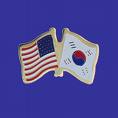Pentagon flexes muscles in Korea: US Threatens China and North Korea

In July, the Pentagon was forced to cancel planned exercises in the Yellow Sea due to its proximity to the Chinese shore. It now appears to be flexing its muscles against both North Korea and China. Immediately after the Yeonpyeong shelling, Washington stepped up pressure on Beijing to exert influence on Pyongyang.
Pyongyang has threatened Seoul with a tough response if an inch of its sovereignty is violated. The threat came ahead of the impending arrival in South Korean waters of the US aircraft carrier George Washington escorted by four warships and at least one submarine from a U.S. naval base in Japan.
The move has prompted an emotional outcry in Tokyo. The ministers were ordered not to leave the capital and be ready to turn up within an hour if they are urgently summoned. Japan fears North Korea’s reaction to the upcoming US-South Korean naval exercises may be unpredictable. Seoul is also very nervous and has evacuated civilians from the Yeonpyeong Island where the above drill is due to begin on Sunday just 11 km from the heavily fortified North Korean coast. On Tuesday, the island came under massive artillery shelling by North Korea. The South was a bit too slow to return fire, which cost Defense Minister Kim Tae-young his post. His successor, Lee Hee-won, has promised to react faster.
Meanwhile, Seoul has been reluctant to admit that its retaliatory fire from Yeonpyeong failed to destroy the North Korean artillery protected by unapproachable cliffs.
In a tough reaction to the planned US-South Korean war games, Pyongyang called them a crazy military provocation and warned that its response would be confrontation for confrontation and war for war.
Washington will surely stand up for its allies – South Korea and Japan – but judging from statements in Seoul and Tokyo, the appearance of a US aircraft carrier and its combat escorts in the potential confrontation zone left them worrying about their security.
In July, the Pentagon was forced to cancel planned exercises in the Yellow Sea due to its proximity to the Chinese shore. It now appears to be flexing its muscles against both North Korea and China. Immediately after the Yeonpyeong shelling, Washington stepped up pressure on Beijing to exert influence on Pyongyang. But China’s reaction was pretty much restrained. It seems that the role of being an arbiter between the two Koreas doesn’t at all appeal to Beijing. Pavel Leshakov, head of the Center for Korean Studies in Moscow, gives his view.
North Korea has always accentuated its independence as an antipode of the South, which in the minds of North Koreans have always been associated with a puppet regime. In Soviet times, North Korea was trying to balance its way through problems between Moscow and Beijing, following a largely independent policy and even reaping some dividends.
China has the strongest influence on North Korea but doesn’t like to show it off for fear of hurting its ally’s sovereignty. At the same time, Beijing is throwing all its weight to prevent a unification of the two Koreas under the aegis of Seoul and Washington. On Friday, news agencies quoted a Chinese official, whose name was not disclosed, who said: “North Korea is our Eastern Germany. Do you remember what happened when Eastern Germany fell? The Soviet Union collapsed”.

